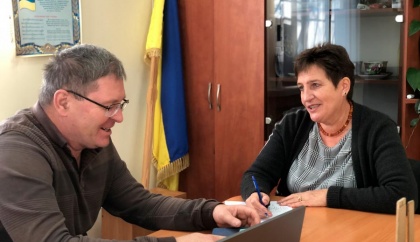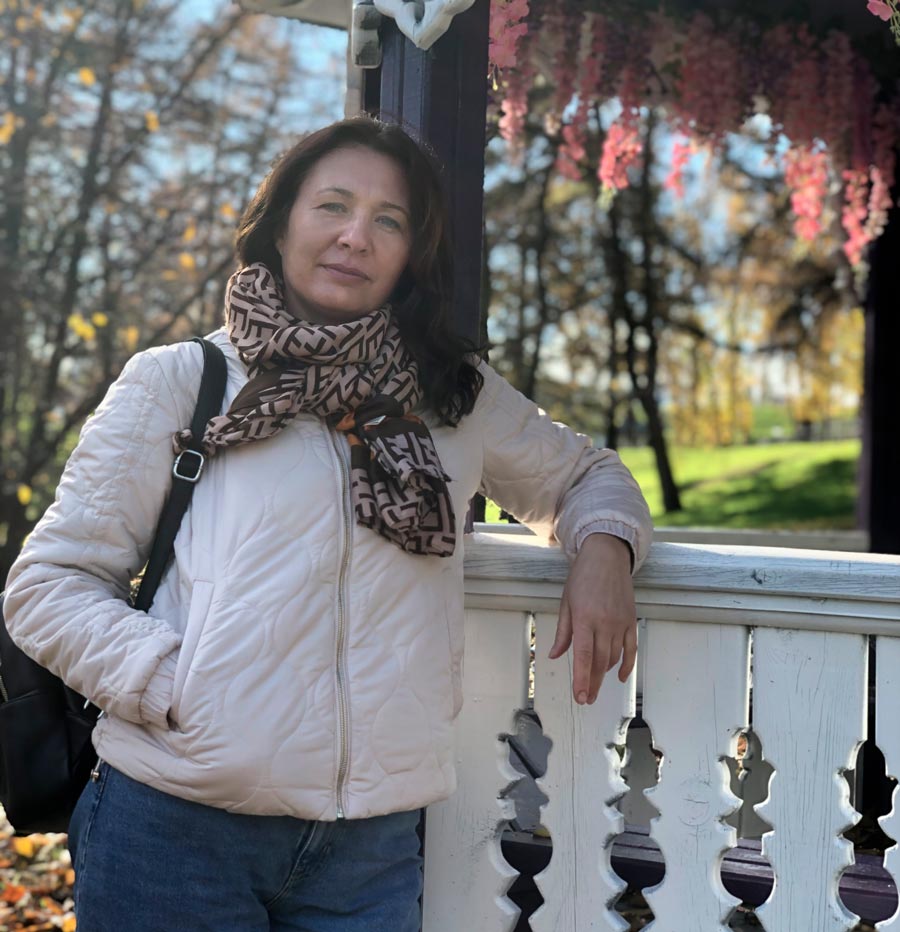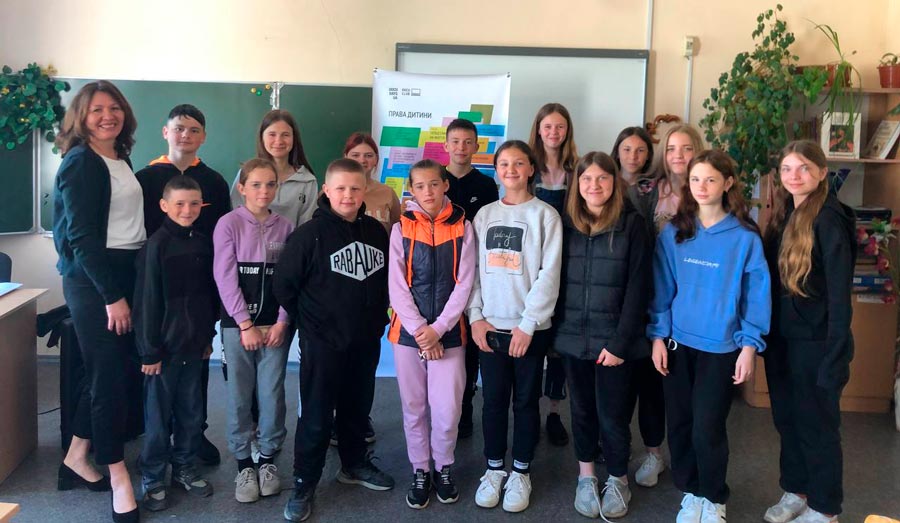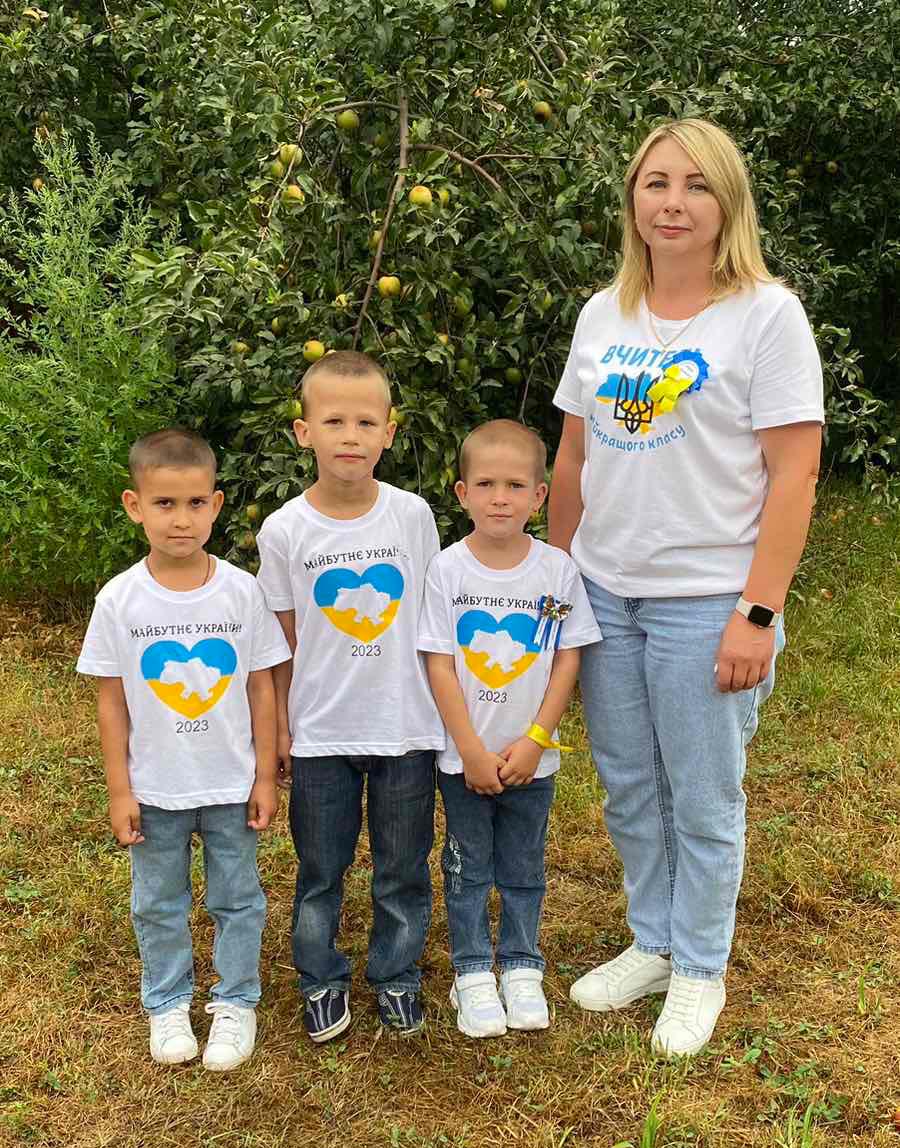
At the end of 2020, when eight villages and towns in the Zolotonosha district of Cherkasy region were being amalgamated into the Voznesensk community, it turned out that, unlike two other educational institutions in the united community, the Bohuslavka Educational Complex did not have a full-time position of a social pedagogue. Meanwhile, the village has numerous problems that would require attention of this specialist: there are several single-parent and large families, as well as families where one or both parents are alcoholics.
Reprinted from the Sheriffs for New Communities Information Platform.
And then there were two unfortunate cases: five children had to be removed from their families under difficult circumstances. Not to mention domestic violence and the schoolchildren’s low level of awareness of their rights until recently. This is when Lyubov Novak, deputy head of the executive committee for executive activities of the Voznesensk village council and moderator of the local Docudays UA film club, decided to act...

WHEN A PUBLIC INITIATIVE IS STRONGER THAN THE ADMINISTRATIVE RESOURCE
In 2022, Lyubov Novak participated in the training at the DOCU/CLUB Documentary Film Club Network and created a Docudays UA film club at the Voznesensk village council. At first, the head of the village council, Oleksandr Tytarenko, doubted whether he should approve such an initiative by his subordinate. After all, the contract with the DOCU/CLUB Network had to bear his signature, and every official document, as is well-known, provides not only for the rights but also for certain obligations of the project participants. However, he believed in the future prospects and is now pleased with the emergence of a new educational and discussion platform in the community. As part of the club's activities, all the schools in the community hosted film screenings and lectures on combating bullying, domestic violence, and other pressing issues. The village council employees also took an active part in the discussion of the film about human trafficking. There are many more screenings to come.

When the opportunity arose to initiate an advocacy project with the support of the DOCU/CLUB Network, Lyubov Novak hesitated whether to include the issue of appointing a social pedagogue for the Bohuslavka Educational Complex in the program.
"We discussed the problem with the school principals and village activists. Bohuslavka is quite a sprawling village with many "remote corners''. Many people here have found themselves in difficult life circumstances. And before that, it just so happened that five children had to be removed from their families. For three siblings, it lasted for a month. Then, the parents seemed to get their act together: they received treatment from alcoholism, got a job, and are slowly improving themselves. But the issue with the other family has not been resolved yet. They have a single mother with numerous issues. So the daughter is now under the care of her aunt...," says Ms. Novak.
However, it turned out that participation in the advocacy program not only helped to move the case forward, but also to spark interest and involve all the villagers in the decision-making process. In other words, it was a "grassroots initiative" rather than an order from above to create a new staff unit for the local educational complex.
"Of course, the issue could have been resolved administratively by introducing a position, finding a right person, and forgetting about the problem. But we decided to try and ask people's opinions through an advocacy campaign and to familiarize them with the benefits of such a solution. As part of the campaign, Lyubov Novak and specialists from the State Service for Children visited the Bohuslavka Educational Complex more than once. They got to know the children of different age groups. The children already recognize them and are not afraid to approach them with questions or problems," said Oleksandr Tytarenko, head of the village council.
As part of the Docudays UA Film Club, film screenings for children were held, accompanied by discussions and talks with the head of the State Service for Children. Due to this, the schoolchildren "opened up" and discovered "strange" adults in a new way. The same applies to meetings with teachers and parents, who were introduced to the issues that are usually dealt with by a social worker. Of course, according to Larysa Holovko, the newly appointed social pedagogue of the Bohuslavka Educational Complex, some of the villagers are still unhappy with the external control over home education methods and the fact that they were taken out of their "comfort zone" ("I am the only one entitled to make decisions in my family!"), but they are few. For the rest of the villagers, the demand for the introduction of a social pedagogue position in the local school is a conscious choice.
This was formally confirmed by hundreds of signatures of parents and other concerned community members under this appeal. As part of the advocacy project, Lyubov Novak prepared and submitted a substantiated appeal for the introduction of the new position to the village council.
"Thanks to this campaign, we managed to find an active person who cares about this and is already working effectively. I'm not sure if we could have found such a person in the case of a direct administrative decision, without studying the community's opinion," admits Oleksandr Tytarenko.
A DISTRICT POLICE OFFICER IS A PROTECTOR RATHER THAN A "SCARECROW"
In the end, the joint efforts helped to get the Voznesensk village council to approve the decision: a half-time social pedagogue position was created at the Bohuslavka Educational Complex (101 students). The aforementioned primary school teacher Larysa Holovko agreed to take on these duties from the beginning of the new school year. Her workload has increased – not only in the school, but also outside of it. This includes family visits, communication with young people after school hours, consultations with parents, and night visits to families in crisis situations together with the police and juvenile prevention officers (unfortunately, there have already been such cases as well).

"I had no experience of such work before. But gradually, I am getting the hang of it. I have already developed a social passport for each class and learned about the different categories of families we have: there are large families, single-parent families, children of military personnel, and one child has the status of a victim of the Chornobyl disaster. The most vulnerable category is families in difficult life circumstances. A month and a half ago, one family was registered as such, and now it is under special control. If the parents do not improve, unfortunately, we will have to make a decision to remove the children from the family," says Larysa.
Among the interesting initiatives, she mentioned the "I Won’t Be Late" campaign, which was announced two weeks before the fall holidays. Before it, the children would often come to the class late after breaks or in the morning: they would sleep in, go to the store or escape to the garden to pick apples... As part of the campaign, the students were explained that such a seemingly small violation could turn into a habit in the future and harm them in their lives and professional careers. The social pedagogue talked to the frequent perpetrators separately, and their parents were informed about their "late birds." Now, according to Larysa Holovko, the teachers say that the students have become more disciplined and responsible.
Social workers from the local community and the juvenile police are frequent guests in the school, visiting the children and conducting educational campaigns. The district police officer talked to each class separately, and the students were informed about their rights, including the regulation that allows children under the age of 14 to stay out until 9 p.m. in the evening, and teenagers aged 14 to 16 – until 10 p.m.
"I explained to the children that they shouldn't be afraid of the police officer, and that they shouldn't run away from him either during the day or during evening raids by law enforcement officers. Previously, when children saw a police officer, they would immediately run away. I explained: you know your rights, you stay in a public place within the allowed time, you don't drink alcohol, you don't smoke, you don't violate laws or the rights of other people, you just hang out, so you have nothing to fear. In the village, there are actually few places where teenagers can relax in the evening. This is why they sit near the store, where there are tables and Wi-Fi, and surf the Internet. When they saw the police, they used to run away. And why, the question arises, should you run away if you're not doing anything illegal? Children shouldn't be afraid of a police officer, because he is not a "scarecrow" but their protection," Larysa Holovko shares her thoughts.
But she says it's more difficult with parents. Most of them understand that this work is necessary, and they themselves took an active part in promoting the idea of creating a social pedagogue position in educational complexes.
"But there are those who say: 'They gave Larysa a briefcase, and now she will run around the houses...' When a person is used to drinking every day and doesn't pay attention to children, and then someone comes to her and says: stop drinking, you won’t be really sympathetic to that annoying intruder," the social pedagogue complains.
However, Larysa Holovko, Lyubov Novak, and Oleksandr Tytarenko are convinced that the situation will gradually change. After all, people have had numerous opportunities that the new position at the educational complex, in spite of being "part-time," benefits the entire village.
P.S.: VOZNESENSK COMMUNITY IS LOOKING FOR A PSYCHOLOGIST
The Voznesensk community is now looking for a psychologist to work with children in educational institutions. Lyubov Novak believes that this should be a separate staff unit, not just another "half-time teacher." And, of course, he or she should be a certified specialist. But...
"The problem is the lack of specialists. We need a real psychologist, not just a teacher who receives extra hours for a salary and is only called a "psychologist" because he or she has read one book on this topic at best. It is necessary that a person has both the appropriate education and skills, and that it is a vocation for him or her. It is very difficult to find such specialists in rural areas," complains Oleksandr Tytarenko, head of the village council.
There is also a problem with finding a psychologist to work with veterans who are returning and will continue to return from the war both with physical and psychological trauma. It is very difficult to find a specialist who has the skills to communicate with this category of villagers.
"It is not so difficult to introduce the position of a psychologist and find money for his or her salary. But the main problem is staffing. The nearest large towns (former district centers) are 20-30 kilometers away. And even they have the same staffing problems," says Tytarenko.
Therefore, Voznesensk and the surrounding villages, as well as thousands of other settlements across the country, hope for an appropriate state program to train specialists and provide communities with such personnel so that this problem does not come as a "surprise."
The development of the DOCU/CLUB Network is funded by the United States Agency for International Development (USAID), the Embassy of Sweden in Ukraine, the National Endowment for Democracy (NED) and the Fondation de France.
The opinions, conclusions, or recommendations are those of the authors and compilers of this publication and do not necessarily reflect the views of the governments or charitable organizations of corresponding countries. The authors and compilers are solely responsible for the content of this publication.
Photos provided from the archive of Lyubov Novak.
P.S. The project "Community Law Centers in Ukraine" is implemented by the Charitable Organization "Charity and Health Foundation" and the NGO "Legal Space Information Resource Center" with the support of the Charles Stewart Mott International Foundation. The views reflected in the material are those of the authors and do not necessarily reflect the views of the Charles Stewart Mott International Foundation.
The publication was prepared within the framework of the Sheriffs for New Communities project with the financial support of the International Renaissance Foundation and the Charles Stewart Mott International Foundation in 2018-2019. Since 2019, the project has been implemented by the Charitable Organization "Charity and Health Foundation" and the NGO "Legal Space Information Resource Center" with the support of the Charles Stewart Mott International Foundation. The views expressed in this material are those of the author and do not necessarily reflect the views of the International Renaissance Foundation and the Charles Stewart Mott International Foundation.



